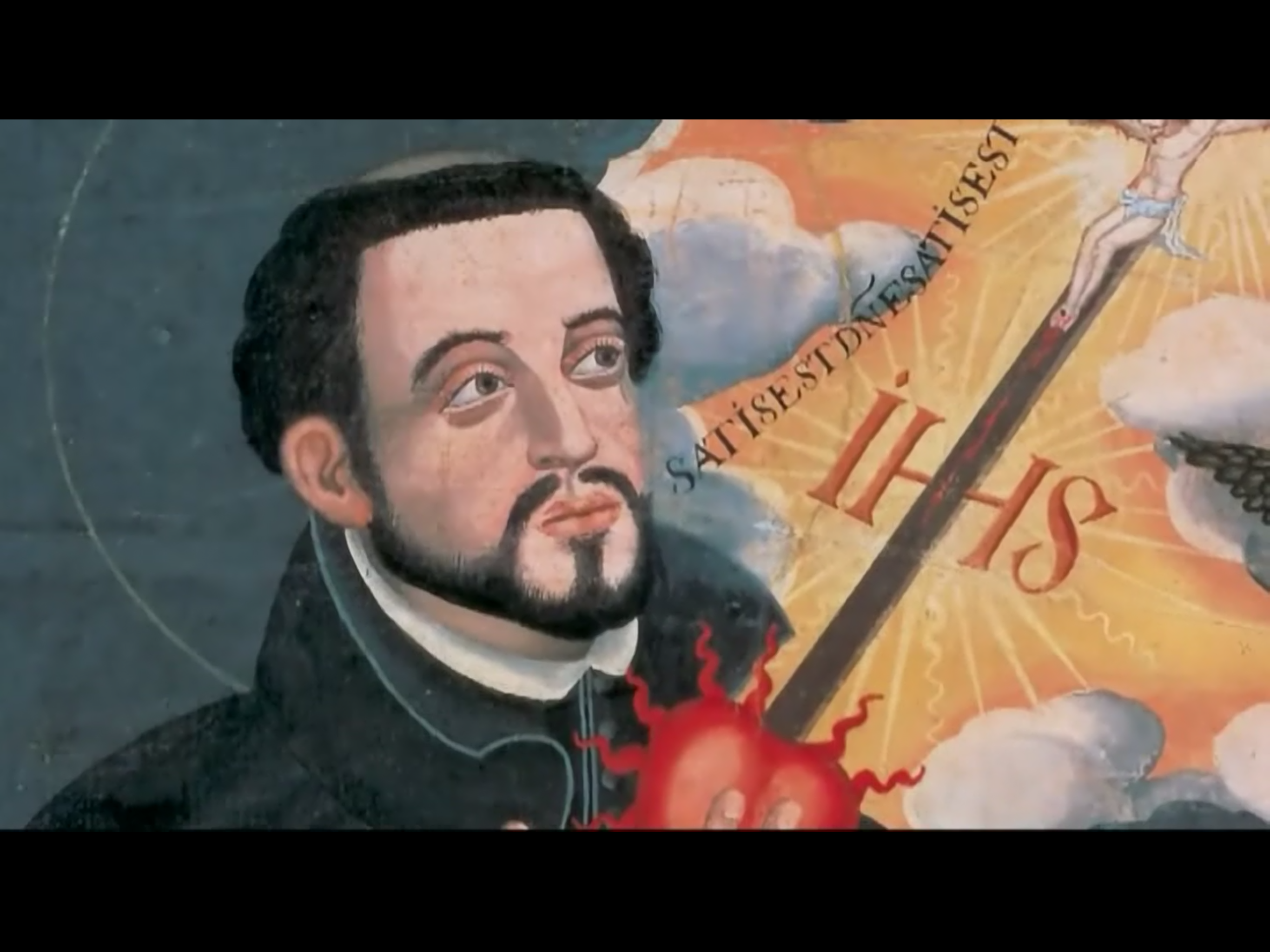Because this blog post will inevitably raise the question “Who can be saved?” I would like to give the two bookends within which all Catholic orthodox answers must fall. One the one end, Pope Pius IX wrote, “By Faith it is to be firmly held that outside the Apostolic Roman Church none can achieve salvation. This is the only ark of salvation. He who does not enter into it, will perish in the flood. Nevertheless equally certainly it is to be held that those who suffer from invincible ignorance of the true religion, are not, for this reason, guilty in the eyes of the Lord.” (Denzinger 1647, Ott 312.) Invincible ignorance means a person is ignorant of Christ and never had the chance to learn about Christ. There is a small chance an ignorant pagan could be saved if he had an implicit baptism of desire. However, the person who would have, could have, should have learned about Christ and His Church but chose not to out of laziness is still under vincible ignorance. Such a person can not be saved without a radical last-minute grace of perfect contrition. This is extremely rare.
The other bookend is found in the words of Christ: “Not everyone who says to me, ‘Lord, Lord,’ will enter the kingdom of heaven, but the one who does the will of My Father who is in heaven.”—Mt 7:21. That not all will be saved is also infallibly defined in the Council of Trent: “But though He died for all, yet all do not receive the benefit of His death, but those only to whom the merit of His passion is communicated; because as truly as men would not be born unjust, if they were not born through propagation of the seed of Adam, since by that propagation they contract through him, when they are conceived, injustice as their own, so if they were not born again in Christ, they would never be justified, since in that new birth there is bestowed upon them, through the merit of His passion, the grace by which they are made just.”—Chapter 3, Session 6, Council of Trent, 13 January 1547 under Pope Paul III. Therefore, it is a heresy to say that there is even a chance that all men are saved.
Today, the most simple members of the Catholic Church have heard over and over during the past few years that even atheists can go to heaven and/or that hell is either empty and/or that wicked souls are mysteriously annihilated before arriving in hell. If such heresies were true, then Jesus never had to die on the cross. If atheists go to heaven and nobody is in hell, then Jesus never had to rise from the dead, “and if Christ has not been raised, your faith is futile and you are still in your sins.”—1 Cor 15:17. Modern theologians can not be correct on “good atheists” going to heaven because this would deny the words the Holy Spirit gave us through the Apostle Paul: “Whoever would draw near to God must believe that He exists.”—Hebrews 11:6. Although Christ’s cross will never be emptied of its power objectively, if simple people go on believing our “top theologians” that atheists can go to heaven (and hell is either empty or not eternal) then more and more Catholics will ironically go to hell.
Last year when I needed a home, a family near Los Angeles gave me a small trailer home on a mountain overlooking the city. One day I was in Los Angeles at a Korean market to get some food. The place was so alive with hundreds or thousands of joyful people carrying strange fish with tentacles that looked like it would be served at a bar in Star Wars. It was a beautiful day in Los Angeles and I marveled at how Jesus Christ died for each one of these people. I thought about how I longed like St. Francis Xavier to preach the Gospel to all of Asia, and yet here they all were in a market in Los Angeles.

In the parking lot outside this market, I was listening to an audio book by Jordan Peterson called 12 Rules for Life: An Antidote to Chaos where the author talks about how he was once overwhelmed to the point of despair as he encountered all the evil in history books describing Communist gulags. Peterson explained that when you lose all purpose in life due to evil, suicide becomes a possible way out. But then, without ever naming himself a Christian, Peterson reveals that we must begin to recognize humanity is already tainted with a pervasive selfishness (original sin?) and that the only other answer besides suicide would be “a responsible atonement” for all the evil in the world. With Asians from all over the Eastern world around me as I listened to his audio book, it hit me at that moment like a ton of bricks that Christianity was the only world religion that could even claim to bring meaning to people’s lives amidst so much suffering. With the cross and the cross alone, suffering is transformed into love. What I knew intellectually became so clear by experience that only Catholicism could bring order to society that is riddled by chaos, even if peppered by daily moments of happiness.
In the parking lot of that Korean market I began thinking of all the world’s religions. I thought of how Islam can not offer meaning or order precisely because their view of Allah is ultimately arbitrary, exemplified in that nominalism that Pope Benedict XVI named at the Regensburg conference. Pope Benedict XVI was correct that the Muslim view of God is nothing more than a capricious bully living out Nietzsche’s will-to-power. Muslims attempt in vain to grasp a divinity who lives so arbitrarily as to function in a manner that can only be described as “willy-nilly.” Practically speaking, if Allah tells you to crash two airplanes into two large towers full of people, you just don’t look for reasons or justification. You just do it. Some extreme Muslims (I mean, sharia-abiding Muslims) find meaning in this, but most Muslim consciences are deeply troubled by such a moral theology. Indeed, it must be lonely to believe in a God who has not made our brains in His own image and likeness. “Allah the Merciful” might be a common term in the Qur’an, but Allah’s peace only comes when the rest of the world submits to the sword of his rulers.
At that Asian market I began to think of the Asian world religions of the far East. The lay professor of a priest friend who taught in Minnesota once explained that when you boil truth down to the two simplest forms, the only two world religions presented to us are Catholicism or Buddhism. Here’s why: If truth matters, you should be Catholic. If truth does not matter, you should be Buddhist. But the modern Buddhist has only two options: Maximize pleasure or extinguish the desire for pleasure. Notice that both of these are essentially individualistic and selfish. This is why all the Caucasians who try out Buddhism in Boulder end up leaving their rice-bowls to drive Beamers. In some sense, I don’t blame them for this, because if there is no meaning to life, you might as well live it up with as much pleasure as possible! If we have no eternal destiny, then we should either extinguish our annoying itches for pleasure, or simply give into them. Both Buddhism and epicureanism essentially have nothing to do with anyone except: Myself. I blogged about both of these options in my last post on World Religions Part I: Three Options.
As I listened to Jordan Peterson in that Korean parking lot, I was watching so many beautiful families who were smiling and walking under the Los Angeles sun. I realized that modern-man can not live in the selfishness of Islam or Buddhism and still hope to survive here on earth, much less heaven. The families I saw made me realize in a new way that only Christ and His Cross could bring meaning through what Jordan Peterson called “responsible atonement” precisely because we were made not for pleasure, or the willy-nilly violence of Islam, or the selfish ascetic feats of Hinduism and Buddhism. We were made for an eternal relationship with God who is Love, and who transfers this love in many ways, including redemptive suffering. No universalist loopholes on salvation can rid us of this infinite desire ant eternal destiny.
The worst evil Peterson described in his book was Unit 731 where 3,000 men, women and children were used as living scientific experiments by the Japanese government between 1937 and 1945. How could there be any hope in humanity if live children could be experimented upon as they shrieked for hours in horrible pain? I hope Peterson sees that Christianity is the only religion that has God encounter the innocent suffering on the cross. Only Christianity can give any meaning to a world of sex-slaved children. CS Lewis points out that although thirst in the desert does not prove there is water in the desert, the reality of thirst does prove that there is water somewhere! Our hunger for our suffering to become redemptive in these days of relativism means that Christ is still offering to be our Living Water. Yes, as I watched all these people from around the world walk in and out of that bustling enormous LA market with smiling children and chests of ice and octopus tentacles, I realized that there was, more than ever, today the offer of Christ as the Eternal Living water being offered them.
Probably half of those Koreans I saw in that market were already Christian, but I want to stay on this question of Buddhists or pagans or Muslims obtaining heaven. Is it enough for a good Buddhist following his conscience to get to heaven? I know the post Vatican II answer is an immediate “Yes!” but such would not be the answer of a St. Peter Claver or a St. Junipero Serra. Although an implicit desire for baptism can save a non-Catholic person (as even Pope St. Pius X says in his catechism) this does not overturn the absolute necessity of baptism. In fact, baptism by water, fire or desire (even if implicit) is the only way to transmit to a sinful soul (every single one of us) the infinite merits of the Passion, death and Resurrection of Jesus Christ to the soul.
With that Nota Bene out of the way, let’s try that question with in blue-collar Catholicism answer: Why couldn’t a good Buddhist get to heaven? Answer: Because the natural goodness of a good life can not reach the supernatural goal of heaven. For that supernatural life, we need the sacraments. Try, for a minute, to see this as a medical equation instead of a legalistic equation on salvation. A man can only do natural good. Therefore, only with supernatural help can man hope to reach a supernatural goal. This is transmitted through grace, beginning with the sacraments. Christ is not a privileged way, like some privileged theologians say. Rather, “the wages of sin is death, but the free gift of God is eternal life in Christ Jesus our Lord.”—Romans 6:23.
Never has the world been more hungry for the sacraments of the Catholic Church but never have erudite theologians been so embroiled in intellectualism so as to squash all international missionary congregations (and undeniable fact that happened to every missionary congregation immediately following Vatican II, with exceptions that can now be counted on one hand.) What would someone like St. Francis Xavier say to our “most educated” theologians today? St. Francis Xavier wrote this excerpt from Asia to Europe in the 16th century, but it could be written today to everyone in American seminaries today who promote that Jesuit priest Von Balthasar’s “Dare We Hope that All Men Might Be Saved?” For my part, I’ll trust the theology of the Jesuit saint who raised the dead. St. Francis Xavier wrote: “Many, many people hereabouts are not becoming Christians for one reason only: There is nobody to make them Christians. Again and again, I have thought of going round the universities of Europe, especially Paris, and everywhere crying out like a madman, riveting the attention of those with more learning than charity: ‘What a tragedy: how many souls are being shut out of heaven and falling into hell, thanks to you!’ I wish they would work as hard at this as they do at their books, and so settle their account with God for their learning and the talents entrusted to them.”

So, I ask myself today: How can we sit around Roman coffee-shops outside the Biblicum or Angelicum or “the Greg” in 2019 and lazily declare that a loving God would not send good pagans to hell? First, we must must begin by realizing that Christ longs for loving relationship with pagans more than us lazy theologians writing blog posts, for it is Christ Himself who says these shocking words: “Truly, truly, I say to you, unless you eat the flesh of the Son of Man and drink his blood, you have no life in you. Whoever feeds on my flesh and drinks my blood has eternal life, and I will raise him up on the last day. For my flesh is true food, and my blood is true drink.”—John 6:53-55. Secondly, we Catholics must realize that “He who knew no sin made Himself sin for us that we might become the righteousness of God.”—2 Cor 5:21. In that sentence, “sin” is not a verb but a noun. In other words, Jesus Christ took upon Himself the filth of my sin, without Himself actually doing it, all with the goal of transmitting to me the holiness of God. This is an exchange that has been labeled Protestant, but substitution theology is in all the Church Fathers (linked at ) and this explains why I can not get to heaven without Jesus Christ’s bloody cross. Salvation must begin here on earth by surrender to Christ, not via last minute mind games with God (as all modernists all bank on.)
Can you imagine what a crushing exchange this must have been in the Sacred Humanity of Jesus Christ to take on my sins and give me His blood? Think for a minute that the eternal Son of God would transfer His love to me, while all I had was hatred of Him (Rom 5.) How can we contemplate that the pure Son of Mary would transfer His own purity to my soul while I scourged Him with my own sins? The scourging of Jesus at that pillar is said by all the mystics to have been the main atonement for sins of sexual impurity, giving Christ that weird word that is in both the Old and New Testament: Stripes. Yes, Christ took my sin in this marvelous exchange of love, so “that we, being dead to sins, should live unto righteousness: by Whose stripes ye were healed.”—1 Pt 2:24 KJV. Here St. Peter, the first Pope, is recalling under inspiration a direct prophesy of what Isaiah foretold in the suffering Messiah 600 years before the birth of Christ: “He was wounded for our transgressions. He was bruised for our iniquities. The chastisement of our peace was upon Him, and with His stripes we are healed.”—Is 53:5 KJV.
Even the nicest person alive today in Los Angeles or Nairobi or Paris has somehow, in some way, offended the infinite goodness of the Blessed Trinity. How could an infinite repair be made by a finite being? We are faced with a harsh truth from both the Old and New Testament: “Without the shedding of blood, there is no forgiveness of sins.”—Hebrews 9:22. Doubly-difficult is the fact that not even the blood of goats in the Old Testament could forgive sins since goats could never provide a boundless and blameless sacrifice. Even the lambs of the Old Testament that were found in the flesh to be “spotless” and ready for sacrifice in the Temple could never be considered “boundless” to atone to an infinitely good God Who is also infinitely offended by sin. Thus, the only blood that could repair a single sin of mine or a billion sins of humanity against an infinitely good God would have to be the very blood of God-Himself. But God is pure spirit, so how could He have blood? Only by becoming a perfect man. But man is sinful, so how could flesh be carry the Divinity to earth? Even if this God-man wanted to die for the whole world, what vessel could contain such commensurate purity? Ah, this God would have to take flesh from something equally pure as Himself—the Blessed Virgin Mary. Mary gave God the one thing He did not have: The ability to die for you and me.

We Catholic must tell the world about this wonder, not how they are already saved without Christ. What a blasphemy and a mockery of the cross of Christ it is to promote Von Balthasar on this topic. The cross of Christ will never be emptied of its power objectively, but if we continue to let modernist theologians teach the loopholes of the faith to seminarians and would-be missionaries, the cross will be nearly emptied subjectively. May it never be. May we begin to recognize bow down before that exclusive but all-embracing cross of Jesus Christ. May all priests begin at the restoration of the Catholic Church be able to repeat with St. Paul: “For I decided to know nothing among you except Jesus Christ and Him crucified. And I was with you in weakness and in fear and much trembling, and my speech and my message were not in plausible words of wisdom, but in demonstration of the Spirit and of power, so that your faith might not rest in the wisdom of men but in the power of God.”—1 Cor 2:2-5

